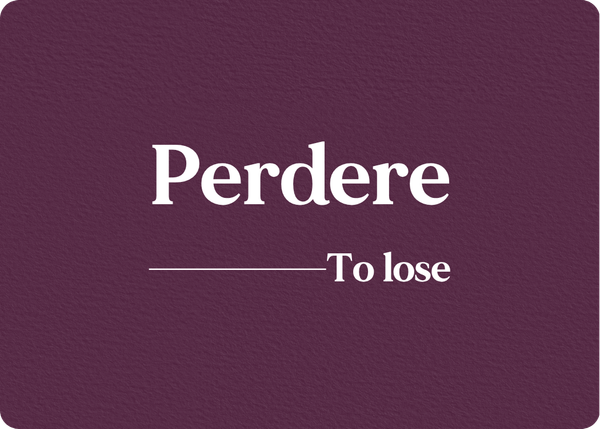What is Perdere?
Perdere is an Italian verb meaning "to lose", "to miss", or "to waste". It belongs to the second conjugation (-ERE verbs) and has some irregular forms. This verb is useful for expressing loss, missing opportunities, wasting time, and various forms of defeat in Italian conversation and writing.
Key Features of Perdere:
- Type: Irregular second conjugation verb (-ERE)
- Meaning: To lose, to miss, to waste, to forfeit
- Irregularities: Simple past (persi, etc.), past participle (perso)
- Auxiliary verb: Uses "avere" (to have) for conjugation in compound tenses
- Past participle: Perso (irregular form - more common) / Perduto (regular form)
Indicativo – Indicative Mood
Presente (Present Tense)
| Person | Conjugation |
|---|---|
| io | perdo |
| tu | perdi |
| lui/lei | perde |
| noi | perdiamo |
| voi | perdete |
| loro | perdono |
Example:
Mario perde la pazienza molto facilmente.
Mario loses his patience very easily.
Passato Prossimo (Present Perfect)
| Person | Conjugation |
|---|---|
| io | ho perso |
| tu | hai perso |
| lui/lei | ha perso |
| noi | abbiamo perso |
| voi | avete perso |
| loro | hanno perso |
Example:
Silvia ha perso il treno delle otto.
Silvia missed the eight o'clock train.
Imperfetto (Imperfect)
| Person | Conjugation |
|---|---|
| io | perdevo |
| tu | perdevi |
| lui/lei | perdeva |
| noi | perdevamo |
| voi | perdevate |
| loro | perdevano |
Example:
Da bambino, perdevo spesso a carte con mio nonno.
As a child, I often lost at cards to my grandfather.
Trapassato Prossimo (Past Perfect)
| Person | Conjugation |
|---|---|
| io | avevo perso |
| tu | avevi perso |
| lui/lei | aveva perso |
| noi | avevamo perso |
| voi | avevate perso |
| loro | avevano perso |
Example:
Avevamo perso il foglio delle istruzioni ancor prima di iniziare il montaggio.
We had lost the instruction sheet even before starting the assembly.
Passato Remoto (Simple Past)
| Person | Conjugation |
|---|---|
| io | persi |
| tu | perdesti |
| lui/lei | perse |
| noi | perdemmo |
| voi | perdeste |
| loro | persero |
Example:
Napoleone perse la battaglia di Waterloo nel 1815.
Napoleon lost the Battle of Waterloo in 1815.
Trapassato Remoto (Past Anterior)
| Person | Conjugation |
|---|---|
| io | ebbi perso |
| tu | avesti perso |
| lui/lei | ebbe perso |
| noi | avemmo perso |
| voi | aveste perso |
| loro | ebbero perso |
Example:
Dopo che ebbe perso tutto, decise di ricominciare da zero.
After he had lost everything, he decided to start over from scratch.
Futuro Semplice (Simple Future)
| Person | Conjugation |
|---|---|
| io | perderò |
| tu | perderai |
| lui/lei | perderà |
| noi | perderemo |
| voi | perderete |
| loro | perderanno |
Example:
Perderai gli occhiali se continui a non metterli nella custodia!
You'll lose your glasses if you keep not putting them in the case!
Futuro Anteriore (Future Perfect)
| Person | Conjugation |
|---|---|
| io | avrò perso |
| tu | avrai perso |
| lui/lei | avrà perso |
| noi | avremo perso |
| voi | avrete perso |
| loro | avranno perso |
Example:
Prima che arrivi il tecnico, avrete perso altre due ore.
Before the technician arrives, you will have lost another two hours.
Congiuntivo – Subjunctive Mood
Presente (Present Subjunctive)
| Person | Conjugation |
|---|---|
| che io | perda |
| che tu | perda |
| che lui/lei | perda |
| che noi | perdiamo |
| che voi | perdiate |
| che loro | perdano |
Example:
Spero che tu non perda questa opportunità.
I hope you don't miss this opportunity.
Passato (Past Subjunctive)
| Person | Conjugation |
|---|---|
| che io | abbia perso |
| che tu | abbia perso |
| che lui/lei | abbia perso |
| che noi | abbiamo perso |
| che voi | abbiate perso |
| che loro | abbiano perso |
Example:
Sembra che la squadra abbia perso la partita per un punto.
It seems the team lost the match by one point.
Imperfetto (Imperfect Subjunctive)
| Person | Conjugation |
|---|---|
| che io | perdessi |
| che tu | perdessi |
| che lui/lei | perdesse |
| che noi | perdessimo |
| che voi | perdeste |
| che loro | perdessero |
Example:
Prima che noi perdessimo la speranza, arrivò l'aiuto.
Before we lost hope, help arrived.
Trapassato (Past Perfect Subjunctive)
| Person | Conjugation |
|---|---|
| che io | avessi perso |
| che tu | avessi perso |
| che lui/lei | avesse perso |
| che noi | avessimo perso |
| che voi | aveste perso |
| che loro | avessero perso |
Example:
Se avessi perso il lavoro, cosa avresti fatto?
If you had lost your job, what would you have done?
Condizionale – Conditional Mood
Presente (Present Conditional)
| Person | Conjugation |
|---|---|
| io | perderei |
| tu | perderesti |
| lui/lei | perderebbe |
| noi | perderemmo |
| voi | perdereste |
| loro | perderebbero |
Example:
Voi perdereste tempo a spiegargli la situazione.
You would waste time explaining the situation to him.
Passato (Past Conditional)
| Person | Conjugation |
|---|---|
| io | avrei perso |
| tu | avresti perso |
| lui/lei | avrebbe perso |
| noi | avremmo perso |
| voi | avreste perso |
| loro | avrebbero perso |
Example:
Avreste perso molti soldi con quell'investimento.
You would have lost a lot of money with that investment.
Imperativo (Imperative)
| Person | Conjugation |
|---|---|
| (tu) | perdi |
| (lui/lei) | perda |
| (noi) | perdiamo |
| (voi) | perdete |
| (loro) | perdano |
Example:
Perdete questa brutta abitudine una volta per tutte!
Lose this bad habit once and for all!
Indefinite Moods
Infinito (Infinitive)
- Presente (Present): perdere (to lose)
- Passato (Past): avere perso (to have lost)
Examples:
Preferiamo perdere con dignità che vincere scorrettamente.
We prefer to lose with dignity than to win unfairly.
Dopo aver(e) perso il portafoglio, ha chiamato la polizia.
After losing his wallet, he called the police.
Participio (Participle)
- Passato (Past): perso (lost) - irregular form, more common than "perduto" - regular form - also used as adjective
Example:
L'oggetto perso è stato ritrovato.
The lost object has been found.
Gerundio (Gerund)
- Presente (Present): perdendo (losing)
- Passato (Past): avendo perso (having lost)
Examples:
Perdendo di vista l'obiettivo, sbagliò strategia.
Losing sight of the goal, he made the wrong strategy.
Avendo perso la strada, chiese indicazioni.
Having lost his way, he asked for directions.
The verb Perdere at a glance: Key tenses you need
| Present | Present Perfect | Imperfect | Present Subjunctive | Imperfect Subjunctive | Present Conditional |
|---|---|---|---|---|---|
| io perdo | io ho perso | io perdevo | che io perda | che io perdessi | io perderei |
| tu perdi | tu hai perso | tu perdevi | che tu perda | che tu perdessi | tu perderesti |
| lui/lei perde | lui/lei ha perso | lui/lei perdeva | che lui/lei perda | che lui/lei perdesse | lui/lei perderebbe |
| noi perdiamo | noi abbiamo perso | noi perdevamo | che noi perdiamo | che noi perdessimo | noi perderemmo |
| voi perdete | voi avete perso | voi perdevate | che voi perdiate | che voi perdeste | voi perdereste |
| loro perdono | loro hanno perso | loro perdevano | che loro perdano | che loro perdessero | loro perderebbero |
Conclusion
Mastering the conjugation of "perdere" is essential for expressing loss, missing opportunities, and wasting in Italian. This irregular second conjugation verb requires special attention to its irregular forms.
Remember the key points:
- Uses "avere" as auxiliary verb in compound tenses
- Past participle is "perso" (irregular and more common) or "perduto" (regular but less used)
- Essential for expressing loss, misplacing, squandering, and failure
- Featured in many common idiomatic expressions
Keep practicing with real sentences and contextual examples to master this Italian verb!





